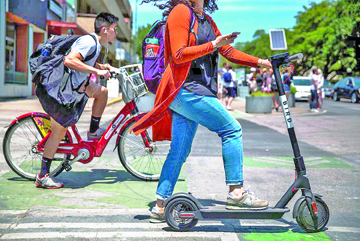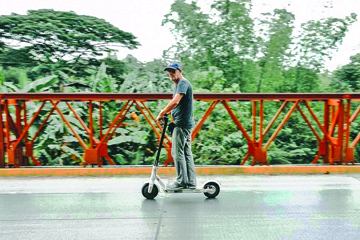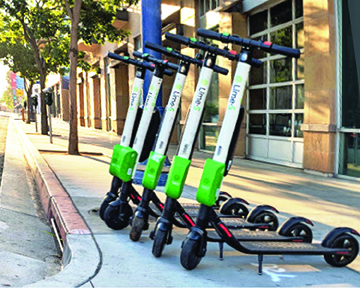by Marissa Smitton

Scooters have become an alternative to cars for many people, especially city residents with quick commutes. In 2018, Denver made over a thousand electric scooters (e-scooters) publicly available to citizens via companies such as Bird and Lime. Since, scooters are becoming an increasingly popular mode of transportation. With their increasing popularity lies a traffic jam and possible safety issues on sidewalks. Denver Public Works is considering a city ordinance that will ban e-scooters from sidewalks and allow them to be legally operated in the bike lane. This legislation has Denver citizens expressing polarizing viewpoints regarding where the scooters should operate. While some residents are in favor of scooters scooting left to the bike lanes, other citizens are opposed and offer their own safety concerns.
After reviewing citizens’ expressed opinions about the scooter program, Denver Public Works is considering the ordinance in an effort to increase the safety of people both on and off the scooters. With the recent influx of public scooters, insurance has had little time to catch up. “Currently, there is no mandatory liability insurance that e-scooter riders need to carry,” Daniel Foster of Foster Graham Milstein & Calisher, LLP informed Glendale Cherry Creek Chronicle. This leaves potential victims of scooter riders with little recourse to retrieve compensation for injuries.
This and other factors prevail while Denver Public Works carefully considers solutions. When speaking with the Chronicle, Public Works Chief of Staff Nicholas Williams expressed that, “the main benefit of this ordinance change is that it will minimize instances of scooter/ pedestrian conflicts.” Williams went on to say, “the most common complaint I receive from residents involves a scooter rider traveling at a high rate of speed and endangering a pedestrian.” E-scooters can reach a speed of 15 mph.

This isn’t the first time legislation has been proposed for the e-scooters. Former Denver Councilperson Mary Beth Susman sponsored the original bill banning scooters from sidewalks. Susman admitted she was unsure as to what this new ordinance offered but ventured a guess that it would “get rid of” the stipulation of the original bill that stated scooters could use sidewalks if posted speed limits exceeded 30 mph. This would seem to be the case, as the new ordinance proposes a total ban of e-scooters from sidewalks.
Most Denver residents who spoke with the Chronicle were in favor of the bill. Denver resident Carson Cameron expressed that scooters “clog up the sidewalks” and hinder accessibility for people who utilize wheelchairs. If scooter riders used the bike lanes, it would provide more accessible space to move around. This sentiment was echoed by fellow resident, Sarah, who also utilizes a wheelchair. E-scooters are technically still allowed on the sidewalk if riders are traveling less than 6 mph, and their use can limit available space for people with physical disabilities or limitations. In highly populated areas such as downtown and Denver University, this is a concern.
Another pro of e-scooters being relegated to bike lanes is that more citizens may be encouraged to ride their scooters, thus reducing car emissions such as smog and other air pollutants. This is the case for resident Jenn Vaught. “I would ride more,” Vaught responded to the Chronicle when asked about the ordinance. Car emissions directly impact the ground ozone level and reduce air quality. This affects everyone, particularly people who are older or have asthma or other breathing concerns. During summer months, air quality alerts frequently report moderate to unhealthy levels of air quality. E-scooters may not be appreciated on sidewalks, but safe operation in bike lanes may improve the air we breathe.
The ordinance should also ensure scooters remain in congruence with other transportation and vehicle laws, which is important to some Denver citizens. This was confirmed by Public Works Chief Williams who said, “it will simplify the rules of the road to mirror those of bicycles, which most people are already familiar with.” Resident Brenna agreed with the idea of scooter riders following similar laws to cyclers and voiced concern for people who operate the scooters intoxicated. If e-scooters were held to similar standards as other vehicles, then citizens can better understand the regulations of operating the transportation devices.

Not all Denver residents are in favor of scooter legislation and have their own safety concerns if e-scooters are permanently banned from sidewalks. Some Denver commuters are concerned that scooters will create even more traffic on already congested streets. A negative of the bill expressed by citizens is that strictly relegating scooters to bike lanes and roads may cause an increase in vehicle accidents. The scooters have been known to cause accidents and most recently, a person died in a scooter related accident on August 4, 2019. The victim, Cameron Hagan, was struck by a car while attempting to cross the street on a scooter. He marks the first scooter-related death in Denver.
Some citizens feel e-scooters may simply be too slow to keep up with traffic flow. But research shows this may not be the case. Bike riders average around 12 mph in city bike lanes, which e-scooters can exceed. This would mean that scooter riders can at least keep up with typical bike lane traffic flow. But some cyclers don’t want the extra traffic. “I just think it’s already too congested,” Denver resident Michael Lewis said. Michael expressed frustration when commuting around the Park Avenue area. “The scooters would only add to that,” he concluded.
E-scooter riders who litter pose another concern. Although leaving a scooter on the sidewalk unattended is not allowed, many people do it. It contributes to clogging up the sidewalks and hindering accessibility, mentioned prior. If scooter riders were banned from sidewalks permanently, there could be an increase of scooters left in bike lanes or in traffic, which again could lead to an increase of motor vehicle accidents.
While the ordinance to ban e-scooters from sidewalks is well-intentioned and for many, long overdue, other Denver citizens pose practical questions to the logistics of adding another transportation device to the bike lane. There are numerous positive aspects of riding e-scooters including but not limited to decreased pollution, and increased sidewalk accessibility. But there are also cons such as increased road traffic and increased accidents. Regardless of where individual Denverites stand, the consensus on both sides is safety first. The safety of citizens on the road should not be compromised for the safety of citizens on the sidewalk and vice versa. Citizens for and against the bill want to feel safe, and they want others to feel and be safe as well.
